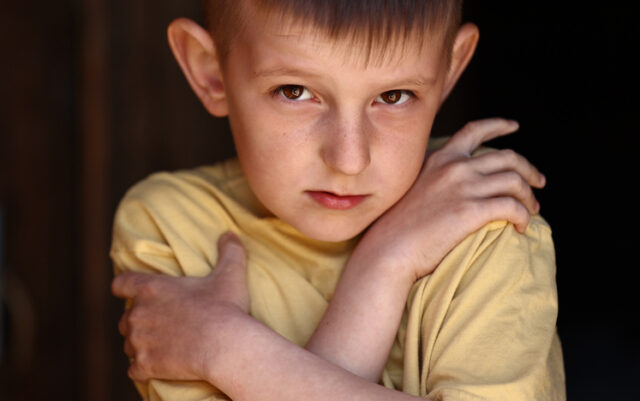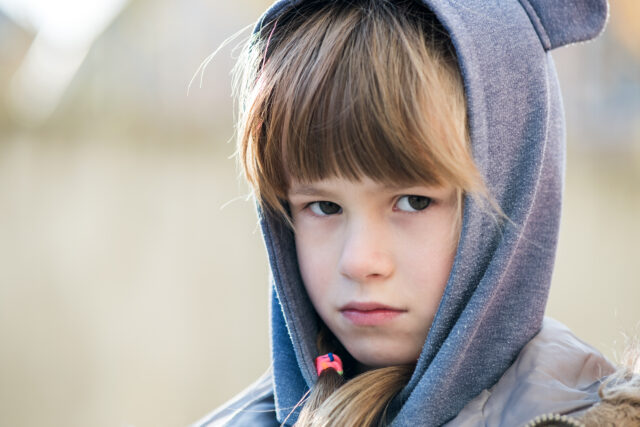If a child experiences social anxiety growing up, that doesn’t just go away once they become an adult.

In fact, socially anxious kids tend to become socially anxious adults if they don’t work on the issue so that they can move past it. As a result, they’ll often do these things — behaviours that are dead giveaways of their discomfort in social situations.
1. They overthink every social interaction they have.

Replaying conversations in their heads becomes second nature. They analyse every word, facial expression, and tone of voice used, wondering if they said or did something wrong. Constantly scrutinising themselves is exhausting and means they’re always worrying about how other people see them and what people think of them.
2. They struggle to maintain eye contact during conversations.

Making eye contact can feel uncomfortable or even intimidating. They might find themselves looking away frequently, focusing on objects in the room, or staring at the ground. Sadly, their avoidance can sometimes be misinterpreted as disinterest or rudeness, when in reality it’s a lingering effect of childhood anxiety.
3. They turn down social invitations pretty regularly.

The thought of going to parties or attending large gatherings can be overwhelming. They might make excuses or simply say no, even when they want to go. Their self-imposed isolation can lead to feelings of loneliness and missed opportunities for connection, but the fear of social situations often outweighs the desire to participate.
4. They hesitate to speak up in group settings.

Whether it’s a work meeting or a casual group conversation, they find it challenging to voice their opinions. The fear of saying something ‘wrong’ or being judged harshly keeps them silent. As a result, they often end up feeling frustrated as their ideas go unheard and opportunities for recognition pass them by.
5. They rehearse conversations before making phone calls.

Making phone calls, especially to strangers, can be a major source of stress. They spend time planning what to say, writing scripts, or practising their tone. Feeling almost over-prepared helps them feel more in control, but it can also make simple tasks like booking appointments feel like major ordeals.
6. They blush easily in social situations.

Their body’s physical response to social stress often manifests as blushing. It’s a visible sign of discomfort that can be embarrassing and draw unwanted attention, making them even more self-conscious. It’s a frustrating cycle that can make everyday interactions feel like ordeals.
7. They struggle with imposter syndrome at work.

Despite their achievements, they often feel like frauds in their professional lives. They downplay their successes and worry that they’ll be ‘found out’ as incompetent. Their lack of confidence can hold them back from pursuing promotions or taking on new challenges, even when they’re perfectly capable.
8. They have a hard time accepting compliments gracefully.

When someone praises them, they often deflect or minimise the compliment. It’s not just modesty – they genuinely struggle to believe positive feedback about themselves. It can make it hard for people to show appreciation and can reinforce their own negative self-image.
9. They avoid confrontation at all costs.

Disagreements or conflicts make them extremely uncomfortable. They’d rather let things slide or agree with people than risk an argument. While this can keep the peace in the short term, it often leads to pent-up frustration and unresolved issues in relationships and work situations.
10. They obsess over past social ‘failures’.
 Source: Unsplash
Source: Unsplash Memories of awkward moments or perceived social missteps can haunt them for years. They might cringe at the thought of something they said or did long ago, even if no one else remembers or cares. Their tendency to dwell on past embarrassments can make it hard to move forward and take social risks.
11. They struggle with dating and romantic relationships.
 Source: Unsplash
Source: Unsplash The vulnerability required in romantic relationships can be particularly challenging. They might avoid dating altogether or struggle to open up emotionally with partners, which can make them extremely lonely as their desire for closeness conflicts with their fear of intimacy.
12. They have a small, tight-knit group of friends.

Rather than a large social circle, they tend to have a few close friends they trust deeply. While these relationships are often strong and meaningful, they might miss out on the benefits of a wider social network. Expanding their friend group can feel daunting and unnecessary.
13. They’re hyper-aware of their body language in public.

They constantly monitor how they’re standing, sitting, or moving in public spaces. This self-consciousness can make them appear stiff or uncomfortable, ironically drawing more attention. Simple acts like walking across a room can feel like a performance and add stress to everyday situations.
14. They prefer texting over phone calls and face-to-face chats.

Texting or emailing gives them time to think about their responses and feels less pressured than real-time conversations. While this can be convenient, it might limit their ability to build deeper connections or handle situations that require immediate verbal communication.
15. They often feel drained after social interactions.

Even enjoyable social events can leave them feeling exhausted. The mental effort of managing their anxiety and presenting a ‘socially acceptable’ version of themselves takes a toll. They often need significant alone time to recharge after socialising, which can be misunderstood by more extroverted friends or partners.
16. They’re extremely observant of other people’s reactions and behaviours.

Years of hypervigilance in social situations have made them keen observers of human behaviour. They pick up on subtle cues and changes in tone or expression that no one else does. While this can be a valuable skill, it can also lead to over-interpretation and unnecessary worry about what other people are thinking.
17. They have a vivid imagination.

Many socially anxious adults develop deep introspection and creativity. They often have rich fantasy lives, enjoy solo creative pursuits, or become avid readers. While this inner world can be a source of comfort and inspiration, balancing it with real-world connections remains an ongoing challenge.




